Goodbye USA
The story of how I left America.

A few weeks ago, when I was trying to open an account at a financial institution here in Hong Kong, someone noticed I was born in the USA and my account was denied.
They wrote “I regret to inform you at this time we are unable to accept bank wire deposits/withdrawals from US citizens. For more information, please refer to our article: Restricted nationalities and countries.” While this is a common experience for Americans living abroad, one I’ve experienced many times before, it was a mistake, a mistake that reminded me to write this blog post.
A few days ago, I received a rather passive-aggressive email from one of my banks asking me to “let us know about your tax connection to the United States” with the threat of closing my account if I don’t. Another common experience for Americans living abroad, another mistake and another reminder to write this post.

Tomorrow, Americans will vote to choose one of two candidates no one really likes. I’m not allowed to vote this time around because two years ago, I finally rid myself of the burden that is American citizenship.
A hard story to tell
I’ve tried to write this blog post a number of times over the past two years. I’ve written entire drafts of this post from scratch more than once and never published them, unhappy with the tone or the content or the narrative or worried about the reaction of people I’ve never met on the internet. Perhaps it was the years of brainwashing…I mean, “civic education”…in US public schools that has scared my psyche and made me afraid of what the tribe will do when it finds out I’ve deserted them. Having to say the "Pledge of Allegiance" every day during one's childhood before he knows what the words "pledge" or "allegiance" even mean really does a job on one's mind.
I want to tell my story because I hope that it will benefit others on their journey towards personal freedom just the stories of others benefited me.
Our story starts about a year ago, in October 2019.
It's 2am on a Saturday morning in Hong Kong and I can't sleep. My body thinks it's still in Paris after two weeks in Europe. One year ago today, I also couldn't sleep but for a different reason. I was tossing and turning from stress the night before what I thought was going to be the biggest decision of my life: to give up US citizenship.
After over 11 years living outside of the USA, I had made an appointment on October 12, 2018, at the US Consulate in Hong Kong to go through the process known as "expatriation" or "renouncing US citizenship."
This was the second appointment in the process. The first had been a few weeks prior, on August 31, 2018. You see, the United States wants you to believe that giving up US citizenship is a Big Deal, and in many ways it is! You lose a whole bunch of rights granted by citizenship such as no longer being able live or work in the country unless you get a visa. In this day and age of passports, visas and borders, (it didn't used to be like this! travel used to be free as in freedom!) if you didn't have another citizenship, you could become "stateless" with nowhere to go and no way to get past borders to get there. To someone like me who was born and raised in suburban Ohio, this felt like a Big Deal.
What they don’t tell you, is that you’re also freed from a number of coercive obligations you never agreed to that other countries don’t impose on their citizens by opting-out of US citizenship. They tell you it's all pain with no gain.
To drive home the Big Dealness of the decision, the State Department made me make two appointments at the consulate to make sure I got their point. And I had to make the appointments well in advance as they were fully booked for months. I wasn’t the only American in Hong Kong trying to exit.
At the first appointment, a nice vice consul named Rachel took me in to a tiny interview room complete with an American flag in the nondescript Garden Road compound. Our interview began with Rachel hitting her head on the phone on the wall quite hard as she was sitting down and me asking her with a bit of a shock, “OMG, are you okay?!?!" After a minute or so of rubbing her head and grimacing, she was fine and we started with our interview.
She roughly followed a script that is specified in the US State Department's Foreign Affairs Manual. She asked me questions about myself and my decision. Where was I from? (Ohio) How long have I lived abroad? (Since May, 2007) Where does my family live? (My parents live in the US and my brother lives in Bulgaria). Did I have another citizenship and passport? (Yes, Italian) Why did I want to give up US citizenship? (It's complicated, but I didn't feel American anymore and when visiting the US anymore I felt like a tourist).
After the questions she started reading me a list of what came off as warnings and disclaimers to make sure I knew what I was getting myself into:
- Any children I had wouldn't become US citizens
- Might not be able to travel to the US again
- Wouldn't be able to live or work in the US an appropriate visa
- I would still have to file for and pay taxes that I owe
- If I didn't have another citizenship I could be come stateless
She then instructed me to take a couple of weeks for a "period of reflection" (this is required according to State Department regulations) and handed me a packet of papers to review listing the consequences giving up my blue passport and outlining the tax implications.
Where better to go to reflect and get some clarity on my decision to exit the US than to visit a country struggling with its own exit decision, the United Kingdom? So I headed off to the UK for a short vacation followed by a work trip in London.
By the time I made my first August appointment, I'd already made the decision - I'd been thinking about it for years and had done a ton of research and due diligence. I'd read a lot about other people's experiences and thinking. I was particularly inspired by bitcoin investor Roger Ver's story and Balajis Srinivasan's talk on Voice vs Exit.
I was most concerned about losing the right to live and work in the US - it seems so many people want this right and that they're willing to go through great pain and inconvenience to get it. However, I hadn't ever used this right in the almost 20 years of my adult life. I’d always competed on the global market without the benefit of “work authorization” protecting me from competition of “aliens.” As life long entrepreneur and a strong advocate of remote work, I didn't ever see myself wanting to sign up for some office job in the States. But would I want to live there?
A tourist in my own country
In 2016, I flew to California and rented a car to do some due diligence on the country I was thinking of leaving. I spent a month driving across the US and back, taking in the sites and visiting places I thought I might like to live. The natural beauty of America and her parks is breathtaking. While it is amazing to visit and even vacation for a few weeks, it wasn’t someplace I'd want to live. New York and Chicago were my favorite cities, but cold climate and snow is a turn off as is the crumbling infrastructure and confiscatory tax rates.
A number of tech friends moved to Austin for the low tax and warm weather, so I stopped there for a few days. After over a decade in Asia, Austin hardly seems big enough to even be called a city. My impression was that it is a bunch of suburban sprawl with some bigger buildings in the middle. And I much prefer being on islands surrounded by water instead of landlocked.
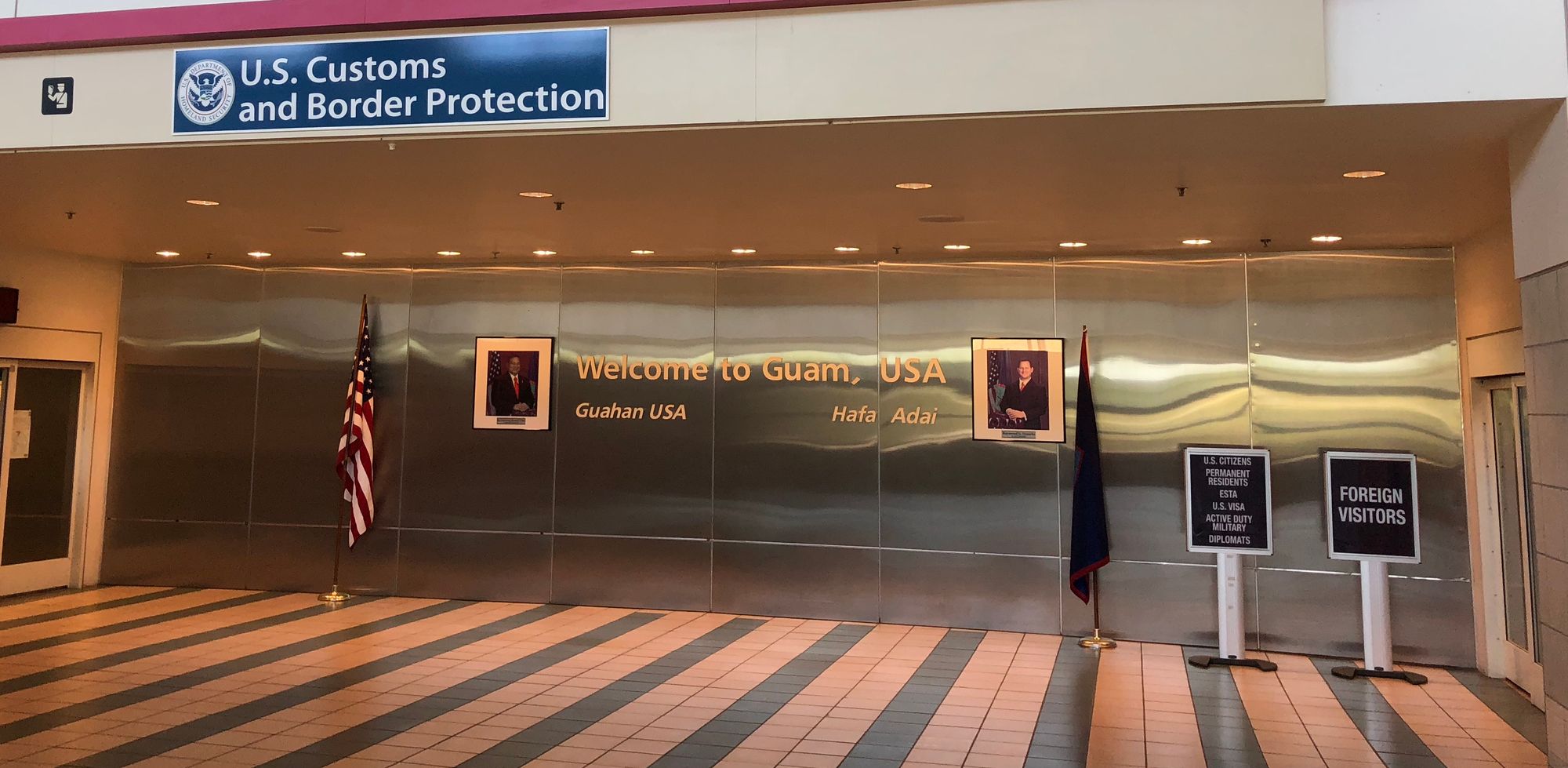
In June of 2018, I took a vacation to America’s only state that is “a bunch of islands surrounded by water,” Hawaii. I had found memories of visiting the Aloha state as a child and wanted to make sure that I wasn't missing out on some future destiny where Larry becomes a Hawaiian like George Clooney in The Descendants. The nature was nice, but the poverty, crime and remoteness from everywhere made it not very attractive as a future home.
I'd discussed the decision with family and friends. Friends ranged from very unhappy to mildly supportive to downright enthusiastic. My brother, also an entrepreneur who has lived outside of the States for more than a decade, was understanding of the challenges the USA imposes on its entrepreneurs abroad and very supportive. My parents were skeptical that it was the right decision. They'd lived their whole lives in the USA and grown up on stories of World War II valor and of their grandparents who had struggled to immigrate to the United States for a better life. They shared their views with me but never gave me any pressure and let me make my own decision.
The oath
October 12, 2018, my second appointment in the renunciation process, quickly arrived. I couldn’t really sleep the night before. I was nervous about both the appointment and a big work announcement. Lots of things were changing.
In the morning, I woke up and took a taxi to the US consulate for my appointment. Here’s a picture of me before the appointment. You can see the stress in my face.
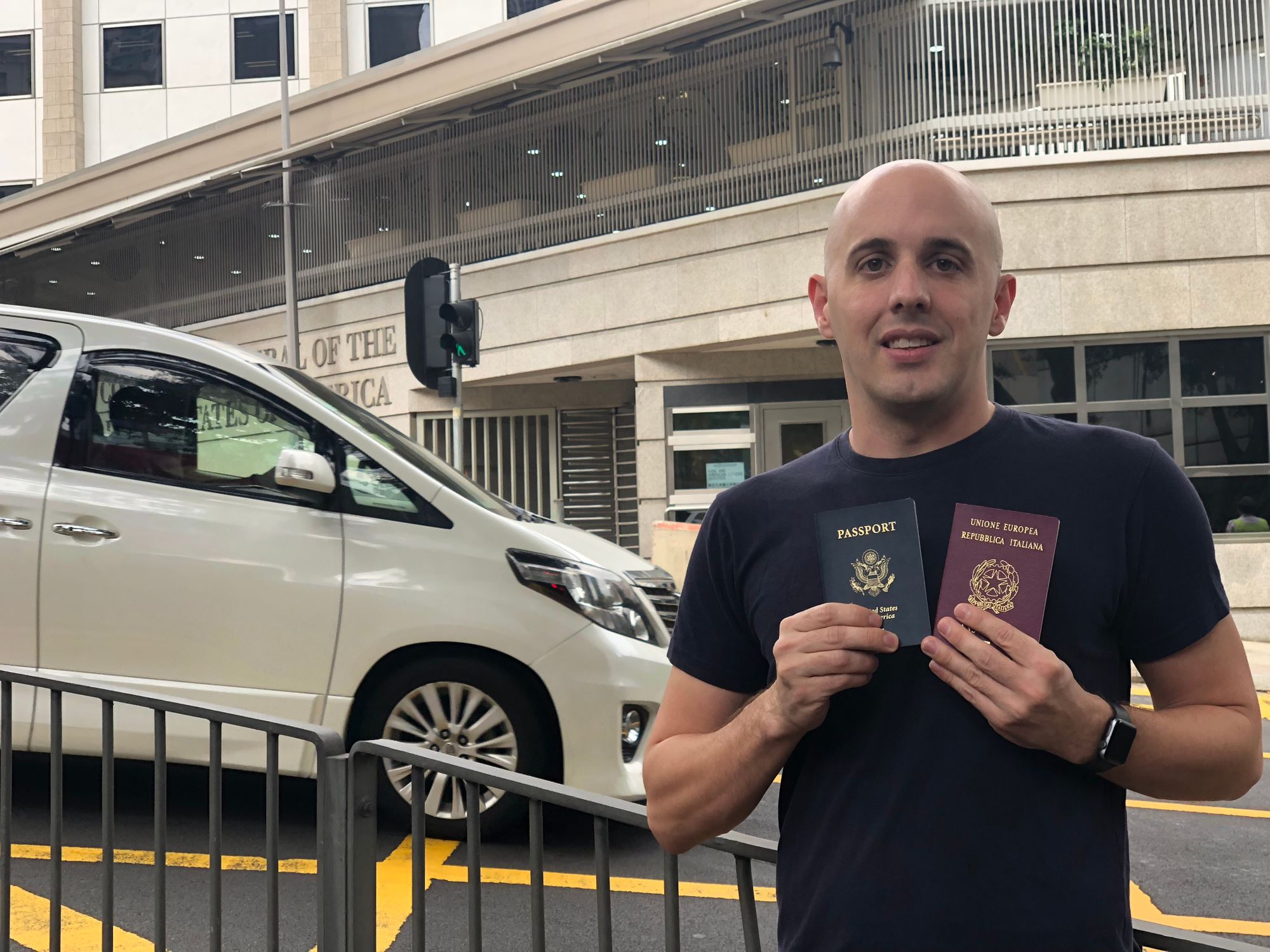
After entering the consulate and going through security, the first step of the appointment was paying the fee: US$2,350. You can’t free yourself from the Land of the Free without having the cash money to buy your freedom. Think of the renunciation fee as an emancipation fee, a lot of money, but a small price to pay for freedom.
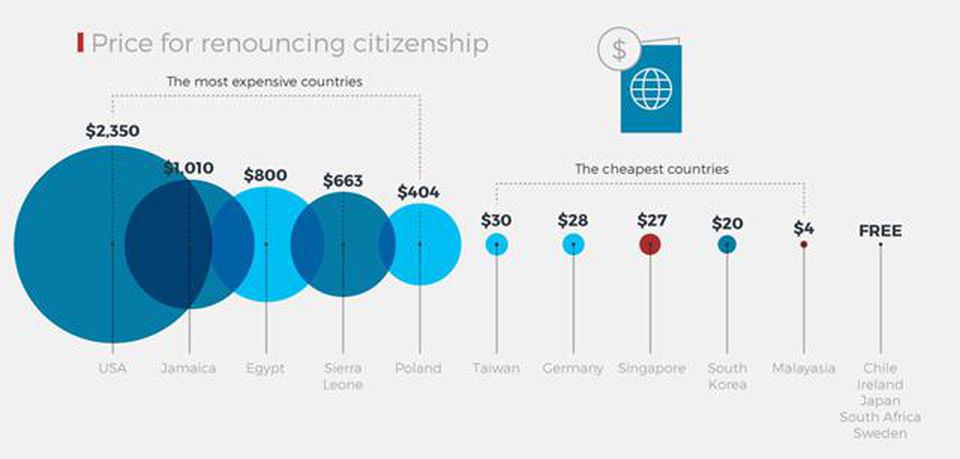
The actual renunciation ceremony was sort of an out-of-body blur. I felt like I was watching myself in the little room with the American flag renouncing my allegiance (which of course the US education system forces children who don’t know what the word “allegiance” means to “pledge”) to the USA.
The consular official told me that they would take my US passport and hold on to it until the State Department approved my renunciation and return it to me canceled along with my Certificate of Loss of Nationality (CLN) at some later date. He advised that if I needed to travel to the US I might be able to borrow the passport for a trip if the CLN hadn’t yet been processed. He also said that if I wanted to travel to the USA in the future, as a citizen of a Visa Waiver country, I should try to apply for permission online through the Electronic System for Travel Authorization (ESTA). If ESTA failed, I’d have to make an appointment to come back and apply for a US visa.
I left the consulate, visibly relieved and headed home for lunch. Here’s me after the process, 1 passport lighter:
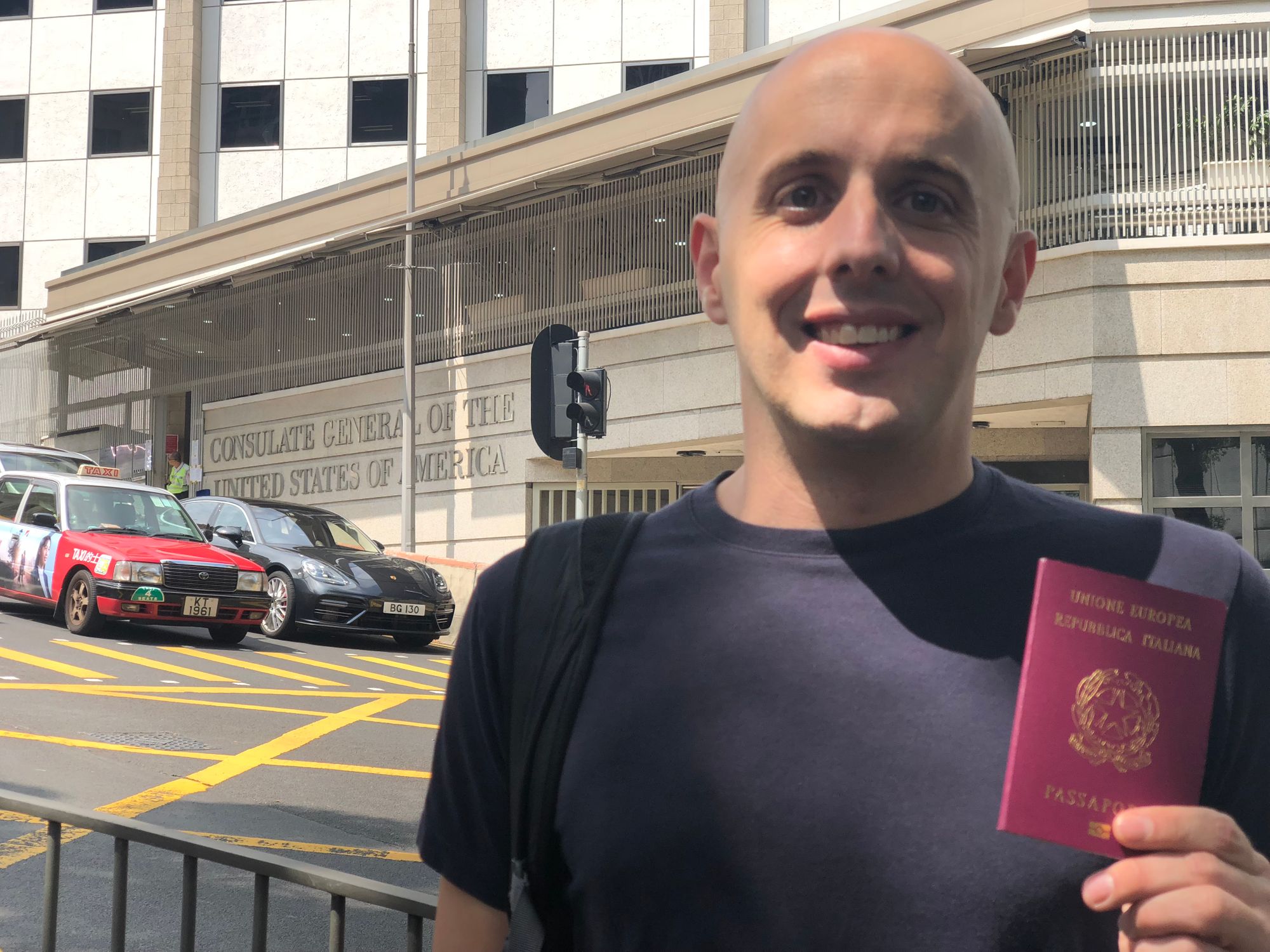
After lunch, I applied for an ESTA just to see if it would be approved. It was instantly approved. That evening, I had a small celebration with some close friends including one who had gone through the same process a year earlier.
A few weeks later, I received a call from the US Consulate telling me that my Certificate of Loss of Nationality (CLN) was ready for pick up along with my canceled passport. As soon as I picked up the CLN, I headed straight to a bank to try to open a bank account as a non-American. And it worked! The process was so much easier as a non-American.
Over the next few weeks, I updated my nationality at various financial institutions around the world and reorganized my financial life, enjoying my new found freedom from having to worry about tax consequences of transactions.
Returning home as a foreigner
At the end of November 2018, I headed to the USA for the first time as a “non-resident alien.” I’d bought a flight on the famous Cathay Pacific flight CX888 that used to stop at Vancouver on the way to New York’s JFK. A couple hours before my flight, I tried checking in online for my flight and was told by Cathay’s website that I needed an Electronic Travel Authorization for Canada because of my stop in Vancouver. That was new to this newly non-American foreigner.
Arriving in JFK, instead of heading for the Global Entry line as I would have as an American, I headed for the empty Crew/Diplomat line thanks to my APEC Business Travel Card (ABTC). Fear-based adrenaline rushed through veins as it always has going through US borders where they aren’t known for their friendly, service-oriented demeanor. I had no idea what to expect.
I handed the officer my passport which he quickly scanned. As he prepared to stamp the passport, he said “Wait a second. We have a ghost passport here,” and directed me to the secondary examination room. “That’s it, it’s over,” I thought, I imagined that they were going not let me in or harass me for giving up on the nation for which my grandfather’s war friends had spilled their blood.
After 10 or 15 minutes, another officer called me to the front of the room and asked me if I had a US passport. I told him I had a canceled US passport because I had renounced US citizenship. I gave the canceled passport along with my Certificate of Loss of Nationality. It turns out that the Department of State hadn’t informed the Department of Homeland Security that I was no longer a citizen. The officer was very kind and said that he would make a note in my record so that they wouldn’t have to waste time asking about this again in the future. Minutes later, I was welcomed back to my former homeland.
Final tax filings
Over the next few months, I filled out a lot of FATCA-related forms for financial institutions that took a while to figure out how I could be born in the USA but not be American. I’d no sooner fill in and deliver one set of forms when two more sets of the same forms would appear in my mail the next day like some sort of sick financial funhouse joke.
In March of 2019 made my final US tax and financial filings which was both expensive and time consuming. I sat at my desk for 4 or 5 days straight muttering line numbers and form codes like a crazy person as I filled out hundreds of pages of papers, both 1040 and 1040-NR forms and all the accompanying schedules, form 8854 and the infamous we’ll-take-half-of-your-money-if-you-don’t-fill-out-this-form Foreign Bank Account Report. Finally, I was done! And that, my friends, is the story of how I got rid of US citizenship.
Life as an Italian living Hong Kong
The past two years as a non-American have gone pretty smoothly. In the pre-Covid era, I travel to or transited the USA a half a dozen times or so. Each time the experience was the same as or better than the experience used to be as an American. US Border Officials would occasionally stop me when I was an American and interrogate me about why I live in Hong Kong. “What do you do? Why are you there?” Now they just ask me “business or pleasure” and send me on my way. And with the ABTC, I’m through even faster than Global Entry ever was.
While some friends and family questioned my decision, especially during the political unrest in Hong Kong last year, as 2020 began and the US devolved into pandemic and political chaos, I’ve heard a lot less of that.
Over the past two years, I’ve found out that a lot of people in Hong Kong have gone through same process as me. It turns out getting rid of US citizenship is pretty popular in this city. My dentist is a former American, as are some on my waterpolo team along with sailors in my club. They’re all successful business people, professionals or entrepreneurs who came to the same conclusion that being American wasn't for them.
Occasionally I find myself feeling sad that a nation founded on such revolutionary principles - life, liberty and the pursuit of happiness - has wandered so far from its roots and in its vindictiveness makes so many great people feel like it’s not worth staying. But then I remember that the future of the USA is no longer my problem to worry about. Others can take care of her. I’ve opted-out and exited.
Why did I want to leave?
I didn’t really talk much about how or why US citizenship became something I actively didn’t want. I’ll save the story of how I went from a red-blooded American Patriot from the nation’s heartland to someone that wanted to be free of the burdens of the blue passport for another time (Sign up to be notified). The why is a lot easier:
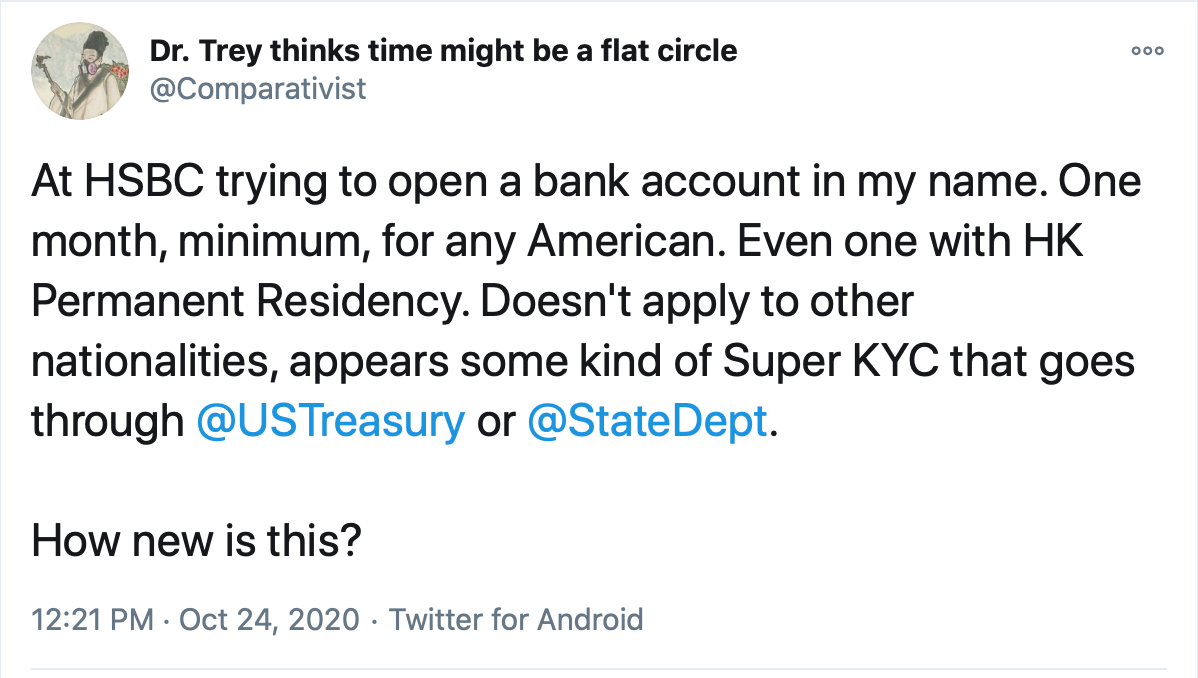
I was tired of being rejected for accounts. Tired of being told with whom I can do business and where I can travel. Tired of being sucked into the national mental illness where the left and right which are largely the same in their desire to use state violence to force their views on others both at home and abroad argue with each other about silly issues to distract the electorate from the nation's real problems. Tired of the compliance paper work and asset reporting. Tired of a system that treats its citizens as property of the state and pawns in a massive geopolitical game.
In short, I was tired of a system and culture that was increasingly hypocritical as what it practices moved further and further away from what what it preached. I wanted the freedom and liberty to pursue my own happiness I was promised by the founding fathers and it was apparent that the nation-state that is their legacy wasn’t very interested in helping me with that.
These problems might be hard to notice if you’ve lived your entire life in the USA, but once you’ve lived abroad and compare your experience with those of peers from other countries, it becomes apparent what a bad deal Americans get.
Voice vs exit
A younger me might have decided to involve myself in the political system to try to change it for the better. Older me realizes that the system itself is the problem. By funding and participating in the system, we give the system legitimacy and only make the system stronger and the problems worse. Exiting is the high leverage and most effective option. Older me just wants to be left alone.
I don't harbor any ill will to the country of my birth. I hope Americans can figure out the challenges they're going through and move closer towards the ideals their nation was founded on, because the world could really use a place like that. I wish her the best of luck.
Questions or comments? Email me at exit@larrysalibra.com or tweet at me.
